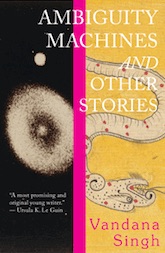Ambiguity Machines and Other Stories is the first North American collection from physicist and writer Vandana Singh, published by Small Beer Press. Of the fourteen stories, all but one are reprints collected from across the past several years; the final piece, “Requiem,” is a novella original to this book.
The effect of this collection is something like a tessellation. The stories are variations on a theme, marrying individual humanist intervention with the sweeping reach of scientifically-based extrapolation. Singh’s worlds are delineated within a rigorous framework that nonetheless leaves edges that either interlock or fade into each other. The titular story, itself originally published on Tor.com in 2015, is a peak example.
Buy the Book


Ambiguity Machines: and Other stories
The overall result is well-balanced, though, as this similarity never crosses into repetitiveness. Singh has a wealth of material to draw from in her exploration of culture and the cosmic laws that bind us all together. The stories in this collection place, thematically, the weight of a tale and the weight of a theorem on equal footing: we need stories to understand ourselves, and stories change our world (for better or worse). While this is a common trope in humanist fiction from any genre, Singh’s approach is uniquely oriented around the story-cultures of India and also modern science.
“Somadeva: A Sky River Sutra” and “With Fate Conspire,” for example, both revolve around an old, old story that is given reality through a ghost—in one case a woman observing another woman writer across the divide of centuries, in another a literal possession. The constant awareness of the connections between people, between animals, between stories, and between the threads of the universe colors all of Singh’s short fiction. “A Handful of Rice” also contains a second story at its heart that shapes the choices of the protagonist and his challenge against his once-brother.
It is difficult to single out the stories contained here as, delightfully, the tapestry they create together is so cohesive. I rarely find short fiction collections with this level of continuity of concept that are not also, at times, one-note. Singh’s skill in weaving narratives is clearest in this total effect. Each individual story has a point and a power; together, an image emerges, a thematic argument of unity.
“Are You Sannata3159?” is perhaps the piece I cared least for of the bunch if pressed. The “physical undercity tricked into eating its own people from a meat processing plant that pops up suddenly” plotline has been done so often that there isn’t much original to contribute. Nonetheless, Singh manages to give it an element of freshness in the moment of sympathy between boy and bull on the guillotine conveyor, paired with our protagonist’s attention to Native cultures that respect the gift of meat from the animal that has died.
As for the two strongest pieces, the final stories “Ambiguity Machines: An Examination” and “Requiem” are undeniable powerful. The titular piece is also a sort of mission statement for the book as a whole. It contains three linked stories of a strange art/math creation that allows for the blurring of boundaries in time/space/self, framed as a thought experiment for an applicant who wants to work with this sort of material. The final questions of the piece provoke the reader into the position of interpreter, asking us to consider the implications of the boundary-dissolution provoked by the ambiguity machines:
Are the conceptual sub-spaces occupied by each machine connected to each other—by geography, concept, or some other as-yet-undiscovered attribute? What can we make of the relationship between human and machine? If an engineer can dream a machine, can a machine dream an engineer?
The novella original to the collection, “Requiem,” comes at the question of life, connection, and the near-future of our planet by putting Indian and Native Alaskan cultures into conversation among the backdrop of a rising tide of White Nationalism in America. Singh’s story of a woman coming to retrieve her much-beloved aunt’s personal and research materials from a far-north research facility is rich, dense, and balanced in its handling of grief as well as its argument about whales, humans, and the languages that can connect us all.
I strongly recommend Singh’s Ambiguity Machines and Other Stories to readers who enjoy a complex mixture of individual human narrative, with all its emotional heft, and a broad exploratory base rooted in the sciences. The stories here stand well on their own but create a solid and fascinating whole, too. Singh has very much knocked it out of the park in an unassuming but thorough fashion.
Ambiguity Machines and Other Stories is available from Small Beer Press.
Lee Mandelo is a writer, critic, and editor whose primary fields of interest are speculative fiction and queer literature, especially when the two coincide. They have two books out, Beyond Binary: Genderqueer and Sexually Fluid Speculative Fiction and We Wuz Pushed: On Joanna Russ and Radical Truth-telling, and in the past have edited for publications like Strange Horizons Magazine. Other work has been featured in magazines such as Stone Telling, Clarkesworld, Apex, and Ideomancer.










